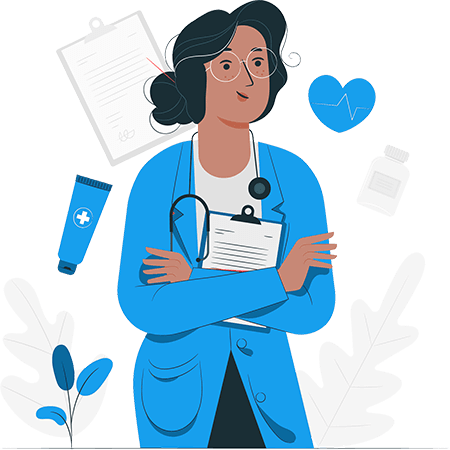Shingles, also known as herpes zoster, is a viral infection that causes a painful rash. It is caused by the varicella-zoster virus, the same virus that causes chickenpox. After a person recovers from chickenpox, the virus can remain dormant in the nerve tissues and reactivate years later as shingles. Shingles is more common in older adults and individuals with weakened immune systems. Approximately one out of every three individuals will develop shingles at some point in their life after the age of 50.
Vaccination is the most effective way to prevent Shingles.

Two doses of Shingles vaccination at a gap of 2-6 months are recommended for all seniors (50 years & above) to protect them from Shingles or Herpes Zoster. Consult your doctor or INVC vaccine expert to get more information on dosage and scheduling of the vaccination.
Currently the vaccine is not indicated for individuals below 50 years of age in India but your doctor can assess and prescribe it based on your medical condition and risk-benefit assessment.
It’s never too late to get vaccinated.
There is no upper age-limit to get the shingles vaccination. If you have missed taking the shingles vaccination earlier, now is the time to get vaccinated. Book a consultation with your doctor or INVC vaccine expert today to learn more about vaccination and protect yourself against shingles.
The cost of shingles vaccination depends on factors such as the type of vaccine, brand, manufacturer, applicable taxes and the vaccination service provider. On an average, the cost of one dose of shingles vaccination ranges between Rs 11000 to Rs 12000. It's best to check with your vaccination provider to get an accurate and updated estimate of the cost.
Vaccination at home offers a convenient, accessible and safe way to protect you and your family from shingles infection. It allows individuals to receive the vaccine in a familiar environment, reducing potential anxiety or discomfort associated with visiting a clinic. Home vaccination not only saves time and effort, it also minimizes exposure to potential infections in crowded healthcare settings. INVC vaccine experts can help you with availability and scheduling of shingles vaccine at home in Vadodara.









Shingles, also known as herpes zoster, is a viral infection that causes a painful rash.
Shingles is a painful skin rash that usually appears on one side of the face or body. The rash is made up of fluid-filled blisters that scab over within 7 to 10 days and typically clear up within 2 to 4 weeks.
Before the rash appears, people may experience pain, itching, or tingling in the area where it will develop. This can happen several days before the rash appears.
The rash usually occurs in a single stripe around the left or right side of the body. However, in some cases, the rash can affect one side of the face, including the eye, which can lead to vision loss. In rare instances, especially in individuals with weakened immune systems, the rash may be more widespread and look like a chickenpox rash.
Other common symptoms of shingles include:
Shingles can be a very painful and uncomfortable condition, but it is usually not life-threatening. However, in some cases, it can cause complications that may require medical attention. These include:
It is important to seek medical attention if you suspect you have shingles, especially if you are at higher risk for complications such as those with weakened immune systems or over the age of 50.
Shingles can be treated with antiviral medications, which can help reduce the severity and duration of the symptoms. These medications are most effective when taken within 72 hours of the rash appearing. Pain relievers, such as acetaminophen and ibuprofen, may also be recommended to help relieve pain and discomfort.
In addition to medication, other treatments for shingles may include:
Avoiding certain triggers: Some people find that certain triggers, such as stress, sunlight, or certain foods, can worsen their shingles symptoms. Avoiding these triggers may help reduce the severity of the symptoms.
The most common side effects of shingles vaccines are:
These side effects are usually mild and go away on their own within a few days. In very rare cases, serious side effects may occur, such as an allergic reaction. It's important to discuss any concerns about side effects with your healthcare provider before getting the vaccine.
Enter your Information and allow us to get back to you for a delightful vaccination experience.
